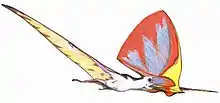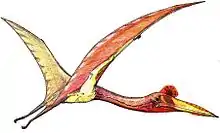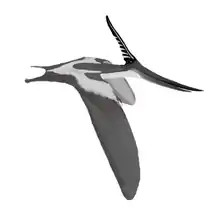Lonchognathosaurus
Lonchognathosaurus is a genus of dsungaripterid pterodactyloid pterosaur from the Albian-age Lower Cretaceous Lianmuqin Formation of Xinjiang, China.
| Lonchognathosaurus | |
|---|---|
| Scientific classification | |
| Kingdom: | Animalia |
| Phylum: | Chordata |
| Order: | †Pterosauria |
| Suborder: | †Pterodactyloidea |
| Family: | †Dsungaripteridae |
| Genus: | †Lonchognathosaurus Maisch, Matzke, and Sun, 2004 |
| Species: | †L. acutirostris |
| Binomial name | |
| †Lonchognathosaurus acutirostris Maisch, Matzke, and Sun, 2004 | |
The genus was named in 2004 by Michael Maisch, Andreas Matzke and Sun Ge. The type species is Lonchognathosaurus acutirostris. The genus name is derived from Greek lonchos, "lance", gnathos, "jaw" and sauros, "lizard", in reference to the fact that it is a reptile with pointed jaws. The specific name means "needle snout" in Latin.
Lonchognathosaurus is based on holotype SGP 2001/19, found near Urumqi in the southern Junggar Basin, the front portion of a skull and lower jaws that came from a large individual; the estimated length of the complete skull was about 400 mm (15.75 in). The point of the upper jaw, composed of the premaxilla bones, was slender and had a needle-like tip. The teeth of the upper jaw appeared far back of the tip, and were well-spaced, diminishing in size from front to back; they ended again in front of the nostrils. They were placed in tooth-sockets that had a low bony ridge but were not otherwise elevated from the jaw. Each maxilla only had eight teeth, and the bottom margin of the upper jaw was straight (unlike in other pterosaurs where it is strongly curved). A sagittal crest was present, with grooves and a concave leading margin.
The genus was, after a cladistic analysis, classified as a member of the Dsungaripteridae, as the sister taxon to Dsungaripterus.[1]
According to Brian Andres Lonchognathosaurus is a junior synonym of Dsungaripterus weii.[2] David Hone on the other hand, argued in 2017 that the species could not be distinguished from Noripterus.[3]
References
- Maisch, M.W., Matzke, A.T., and Ge Sun. (2004). A new dsungaripteroid pterosaur from the Lower Cretaceous of the southern Junggar Basin, north-west China. Cretaceous Research 25:625-634.
- Andres, B.; Clark, J. M.; Xing, X. (2010). "A new rhamphorhynchid pterosaur from the Upper Jurassic of Xinjiang, China, and the phylogenetic relationships of basal pterosaurs" (PDF). Journal of Vertebrate Paleontology. 30 (1): 163–187. doi:10.1080/02724630903409220.
- D.W.E. Hone, S. Jiang, and X. Xu, 2017, "A taxonomic revision of Noripterus complicidens and Asian members of the Dsungaripteridae", Geological Society SP455. New Perspectives on Pterosaur Palaeobiology doi:10.1144/SP455.8
External links
- Lonchognathosaurus in The Pterosauria













